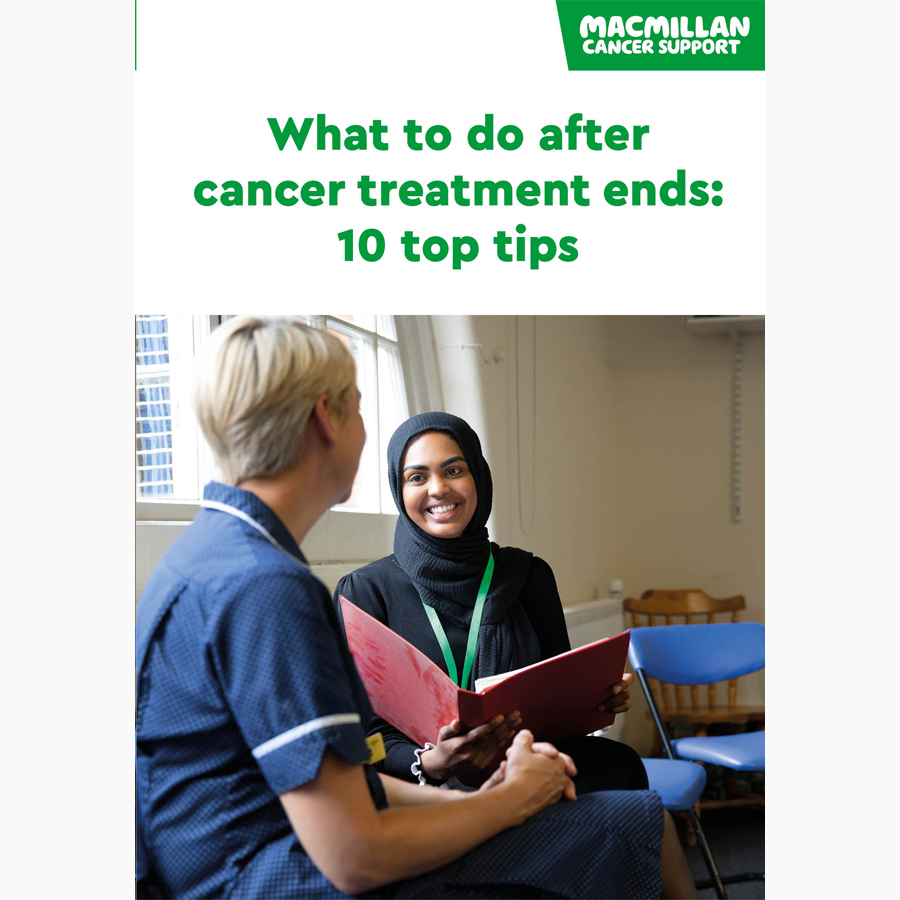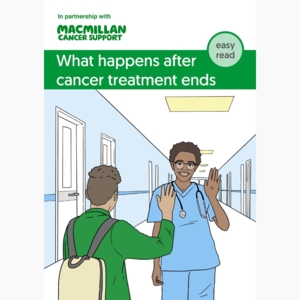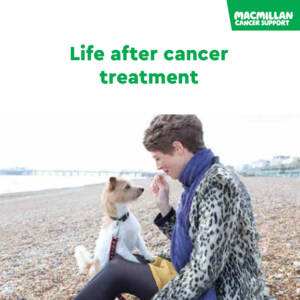Finishing cancer treatment
At the end of treatment your cancer team will talk to you about what to expect and what your follow-up is likely to involve.
Preparing for the end of treatment
For some people, the end of treatment means they are not likely to need any more cancer treatment. Some people may have ongoing treatment to help reduce the risk of the cancer coming back. For others, treatment is about managing the cancer over a long period of time.
When your treatment ends, you may feel relieved. But you may still have side effects from treatment and other emotions to cope with. You will need time to find out what is now normal for you. It can take time to adjust.
You may also be thinking about positive changes you want to make. These might include focusing on your well-being or planning some things to look forward to.
Towards the end of your treatment, you usually have a discussion with someone from your cancer team. This may be with your cancer doctor, specialist nurse or another member of your healthcare team. They will tell you what to expect after treatment ends. They will also ask about any concerns or specific needs you have.
Online HOPE Programme
Sign up for the online HOPE programme – a self-management programme to help you to develop techniques and strategies when living with or after cancer.
Booklets and resources
Knowing who to contact
Your cancer team will give you details of who to contact after your treatment ends. They may be called your key worker. This may be a specialist nurse or another member of the cancer team. Or it may be a member of another healthcare team, depending on your situation.
Keep their contact details in your phone or somewhere safe.
You could also tell your GP that you are approaching the end of treatment. You can talk to them about any concerns you may have.
Questions to ask your key worker
Knowing what to expect can help you adjust to life after cancer treatment. For example, you may want to know:
- how to contact your healthcare team
- how often will you have follow-up appointments (check-ups) and for how long
- how often you might need blood tests, scans or other tests, and who will arrange them.
You may also want information about:
- how to manage any side effects or symptoms you have
- side effects of your treatment that may happen months or years after treatment ends – these are called late effects
- symptoms to look out for that may be signs of cancer
- what you can do to stay healthy and well
- health and well-being clinics, events or support for people with cancer in your area
- if there is anything you can do to help reduce the risk of cancer coming back.
Related pages
Your personalised care and support plan
You may hear some healthcare professionals talk about personalised care. This is a term that combines all the following options:
-
Holistic Needs Assessment
In some hospitals, the discussion with your cancer team is called a Holistic Needs Assessment (HNA). You may have already had an HNA when you were first diagnosed.
During an HNA, you answer some simple questions about all areas of your life. This helps you to identify any concerns you would like to talk about. You can then discuss these with a member of your cancer team. Together you can talk about possible solutions and make a personalised care plan. This makes sure your care is planned based on what is most important to you. We have more information about HNAs.
-
Personalised care and support plan
Your cancer team may write a care plan for you, based on any concerns you have discussed. It explains how you will be supported now and in the future. It also lists services you may want to use. Your cancer team should give you a copy so you can share it with other healthcare professionals.
Your needs and concerns may change over time. You can have another HNA and make a new care plan at any time.
-
Treatment summary
At the end of your treatment, your cancer team may create a treatment summary. This may be after a certain phase of treatment, or after you finish all your treatment.
It will describe the treatment you have had and helps you understand what to expect next. Knowing what happens next can help you adjust.
Your treatment summary will include information about:- the cancer and treatment you have had
- possible side effects of treatment
- any symptoms to look out for
- details of follow-up appointments and tests you may need
- contact details for your cancer team.
Your cancer team will give you a copy of your treatment summary. They will also send one to your GP. If you are not given a copy and would like one, talk to your cancer team.
HNAs, personalised care plans and end-of-treatment summaries are not standard practice in all hospitals. But more hospitals are doing them. They may happen in the ways we describe, or more informally. You will always have the chance to talk to someone from your cancer team before your treatment ends.
Cancer care review
You may have an appointment with your GP or someone else from the primary care team after you have been diagnosed with cancer. This is sometimes called a cancer care review. We have more information about cancer care reviews.
What you can do to help yourself recover
Your cancer team can give you advice on what you can do after treatment finishes. For example, they may:
- explain how any treatment side effects or symptoms can be managed
- suggest exercises to improve your movement and become more active
- tell you what symptoms to look out for
- suggest ways you can improve your wellbeing.
If you are taking any ongoing cancer drugs, such as hormonal therapy, it is important to take them exactly as your cancer team explains. Do not stop taking them without getting advice from your cancer doctor.
Knowing more about your condition and recovery will help you get the most benefit from your treatment. Follow the advice from your cancer team and make it a part of your usual routine.
Visiting your GP after treatment
You could also visit your GP to let them know you have finished treatment and talk about any concerns you may have.
Your GP is responsible for your general health. They can also give you emotional support and advice on:
Your GP practice may also be able to support people close to you.
About our information
This information has been written, revised and edited by Macmillan Cancer Support’s Cancer Information Development team. It has been reviewed by expert medical and health professionals and people living with cancer.
-
References
Below is a sample of the sources used in our after treatment information. If you would like more information about the sources we use, please contact us at cancerinformationteam@macmillan.org.uk
ESMO Expert Consensus Statements on Cancer Survivorship: promoting high-quality survivorship care and research in Europe. Published: 10 August 2022. Annals of Oncology (accessed April 2023).
NHS Personalised Stratified Follow Up (PSFU) Pathway in Cancer Care. Published 2022.
Macmillan Cancer Support. Providing personalised care for people living with cancer: a guide for professionals providing holistic needs assessments, care and support planning. Published October 2019. Available from: www.macmillan.org.uk
Date reviewed

Our cancer information meets the PIF TICK quality mark.
This means it is easy to use, up-to-date and based on the latest evidence. Learn more about how we produce our information.
The language we use
We want everyone affected by cancer to feel our information is written for them.
We want our information to be as clear as possible. To do this, we try to:
- use plain English
- explain medical words
- use short sentences
- use illustrations to explain text
- structure the information clearly
- make sure important points are clear.
We use gender-inclusive language and talk to our readers as ‘you’ so that everyone feels included. Where clinically necessary we use the terms ‘men’ and ‘women’ or ‘male’ and ‘female’. For example, we do so when talking about parts of the body or mentioning statistics or research about who is affected.
You can read more about how we produce our information here.







